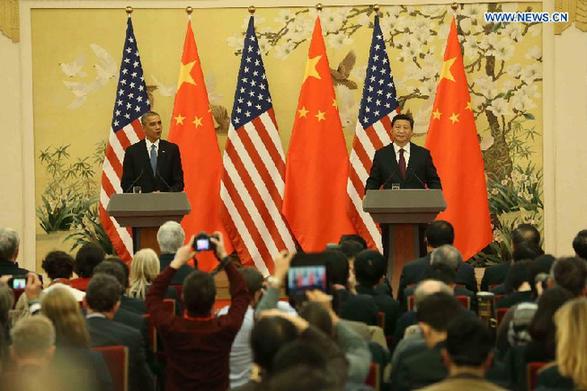China-US relations at a new historical starting point
- By Zhao Jinglun
 0 Comment(s)
0 Comment(s) Print
Print E-mail China.org.cn, November 14, 2014
E-mail China.org.cn, November 14, 2014
U.S. President Barack Obama's state visit to China and the talks between Presidents Xi Jinping and Obama have brought China-U.S. relations, after 35 years of development, to a new historical starting point. Xi has characterized China and the United States as ballasts. For the Ark to sail steadily and on course, it needs something that serves as ballast. We are all in the same boat.
|
|
|
Chinese President Xi Jinping (R) and U.S. President Barack Obama attend a joint press conference following their talks at the Great Hall of the People in Beijing, capital of China, Nov. 12, 2014. [Xinhua/Liu Weibing] |
In fact, relations embarked on a new course in June last year when the two presidents agreed at the Annenberg Retreat at Sunnylands in Rancho Mirage to establish a new type of major power relationship: with no conflict, no confrontation, mutual respect and cooperation to achieve win-win results.
Their job in the Beijing talks was to make that relationship more solid and substantial, to raise it to a higher level. To do so, Xi made a six-point proposal, which Obama also embraced. The gist of the proposal includes efforts to enhance strategic trust. Xi said the defense departments of the two countries have signed memorandums of understanding (MOUs) on establishing a mutual reporting mechanism on major military operations and a code of safe conduct for naval and air encounters. It shows both sides are willing to take pains to avoid accidental military conflict.
As China and the United States are two countries with unique characteristics, they need to respect each other's sovereignty and territorial integrity as well as political system and development model. This point is important, as Henry Kissinger said the Americans are convinced that "American principles are universal."
They are to deepen cooperation in every field. For example, both sides agreed to limit carbon emissions: the United States agreed to reduce carbon emissions by 2025, by as much as 26-28 percent compared to 2005 levels. China expects carbon emissions to reach a peak around 2030, after which they will begin falling; and the country's non-fossil fuel share in primary energy consumption is expected to rise to 20 percent by 2030. A sour note has come from Republican Senator Mitch McConnell, who called the agreement "unrealistic."






